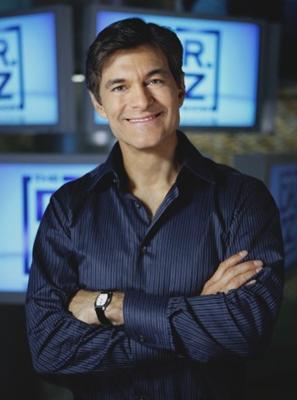What if I told you you could be happier in just 28 days?
That's what Dr. Oz put forth in a recent episode of his tv show, and he delivered on that promise.

This blog is quite different from other articles. It's a transcription I made while watching the show so that I could share it with you. I put a lot of time into this, and I am very grateful that my t.v. let's me pause and rewind because I am by no means a stenographer!
Dr. Oz offers a simple 4 step plan and we will break it down. First, let's "watch" the show!
Dr. Oz's 28 Days to Happiness Plan
Show Introduction:
What if I told you you could be happier in just 28 days? That's the challenge I'm issuing to my next guest. You probably know someone just like her: a Debbie-downer whose negativity brings everyone around them down. But that's about to change in just 4 weeks.
The show cuts to the guest, Mikayla, who explains her negativity and unhappiness...
Some people say every cloud has a silver lining, but I can't see it. I guess you could say I'm a very critical person. I have negative things to say about everything I come across. I just don't understand why people are so positive.
The truth is I don't get along with everyone. When I'm engaged in a conversation I always see the downside. I'm not depressed. I'm just not happy. It's not like I mean to be a killjoy. I just want people to have all the facts. This has been going on for 15 years. NO seems to be my answer to everything. Not everything in my life is negative. I have a wonderful husband and a son named Gabriel, who is the love of my life...
Maybe I'm so used to being a Debbie down I don't know how to be anything else.
Dr. Oz's interview begins...
Dr. Oz: So why do you think you tend to be so negative?
Mikayla: It's just the way I am. Some people see the cup half full. I see it half empty.
Oz: How has it held you back? The negativity you carry around with you.
Mikayla: It's stopped me from having the relationships I want with friends, family, work. It's just not working; it's holding me back.
Oz: So I was curious; I actually wanted to find out how happy you were and how negative you were. There's actually a scale for this called the Oxford happiness questionnaire. And we gave it to you, and there's the scale behind you. And the average is about 4 and a half, and you were about 3.2 out of a total of 6.
Mikayla:
I'm not happy.
Oz: You're not happy.
And you're not depressed; I want to emphasize that. We're not talking about someone who is wallowing in despair. You just find negative things. [...] I feel passionately that
there are a lot of people like you who, like you said, are perceiving the glass half empty even when there's lot of other opportunities. And what were going to do is help you improve over 28 days where you are. And joining us to help do this is research psychologist and author of The How of Happiness, Sonja Lyubomirsky.
We all have someone like Mikayla in our life and it's not depression. It's some other facet of our personality that drags us down to negativity. Explain that, why are they so negative?
Sonja Lyubomirsky: Well there are some people that feel they see the world the way it really is. And everyone else around them is walking around in rose colored glasses.
They would rather be right than be happy. And my response to that is that
there is no right way to see the world. The world is both a terrible place, there's suffering and injustice; but it's also a wonderful place, there's beauty heroism and kindness and
it's what you choose to focus on that determines your happiness level.
Oz: So if you're negative or positive, talk us through some of the consequences. What are the differences?
Lyubomirsky: Well the consequences of being negative and unhappy can be really harmful to your relationship and to your work. It turns out that
people who are happier and more positive are more creative, are more productive, they make more money. They are healthier.
In fact a study I just found out about today was looking at photographs of major baseball players and found that those who showed sincere, genuine smiles - who were more positive and happier - would live 7 years longer.
Oz: Now you have a 28 day plan that anybody can take part in. We're going to start today. Well explain it crisply and clearly in 4 steps.
Step number 1 is a daily diary.
Lyubomirsky: That's right. I do this with my students; I teach a class on happiness. It turns out that
a lot of people don't know what actually makes them happy. What situations or what individuals make them feel engaged, happy energized or motivated? So several times a day you write down
what are you doing, who are you with, am I happy, am I absorbed, am I energized. And then you do more of those things that make you happy.
Oz: Mikayla, can I ask you a question? Do you know what makes you happy?
Mikayla: My family, going on walks with my son, staying home with my husband. That makes me happy.
Oz: Because this is what I want to do. That questionnaire is up there. It's very straightforward. I think it's a brilliant idea. I want to understand, and I think you need to understand what other things besides your lovely son and your husband give you happiness. Because there have got to be other things that give you happiness. It could be a piece of warm bread. It could be someone smiling at you as you walk outside the house. Those are the things we need to identify here.
Okay,
step 2 is to figure out how we come off to other people.
Lyubomirsky: Yea, this is an idea that originally was proposed by Darwin.
When you act happy - when you show the outward expression of happiness -that's going to intensify the feeling. There was a great study done on women. They got botox injections for their frown lines because they were frowning so much. And what happenened was they got a lot happier.
People respond to you more positively. You feel more attractive, more confident, happier. And so just a
cting happier and more positive can actually lead you to feel more positive and happier.
Oz: So essentially you're going to fake it 'til you make it. It works in other places too!
Week 3 has to do with combating negative thoughts that occur during social interactions. And I know this occurs to people who are negative. So
step 3 is really all about creating a diversion so you don't focus on that.
Lyubomirsky: You mentioned seeing the glass as half empty. These are sort of negative thoughts – a lot of us especially women tend to over think. We're dwelling on our feelings and our problems. We do that alone. We do that with other people. And so the idea is that we need to find strategies that help us divert our attention from the negative thoughts onto something that's neutral or positive.
Oz: Mikayla, do you ruminate a lot?
Mikayla: Yes.
Oz: What do you ruminate over?
Mikayla: For example, if I'm a good mother. I keep asking my husband, am I a good mother? I don't see myself as being a good mother. I try.
Oz: So when you hear those thoughts we want you to create a diversion. This is one little tip. This is a rubber band I want you to wear around your wrist. When you start to ruminate I want you to snap it.
When reading your book (The How of Happiness) there's another good idea to count the number of times people says "um" or some other ridiculous but tedious-on-the-surface, but sort of funny way of keeping track of what's going on in a conversation so you don't go in your own mind and do destructive things to yourself.
Week 4 is about a random act of kindness. You're going to do 1 a day. Why is that important?
Lyubomirsky: Well research from my own laboratory has shown that
people who practice acts of kindness on a regular basis become happier. And they can be really little things like emailing someone to thank them, saying to someone they look nice, feeding someone's parking meter. And those acts of kindness gives us a burst of positive emotion and those positive emotions can serve as
antidotes to negative emotions or negative thoughts. And so they are very effective. They are very concrete.
Oz: Can we all do it Mikayla?
Mikayla: Yes, I want to do it. I want to become positive.
Oz: You have 28 days to do it. We're going to follow your story. I am fascinated and I want everyone at home to realize
you can do it as well.
Mikayla, I want to thank you for coming forward with a story that I know is very common in this country. Sonja Lyubomirsky, I appreciate all your insights and I love the book.
Dr. Oz's 4 Week Plan in a Nutshell
To summarize the 4 week plan, the focus is on one unique area each week that helps improve happiness and beat negativity.
- Keep a Daily Diary
- Fake It 'Til You Make It (Recall the botox study just mentioned)
- Divert Negative Thinking and/or Distract Yourself (Try the rubber band trick or others in the book)
- Do Random Acts of Kindness
If you've made it this far, it's clear you want to improve your happiness or tone down the negativity in your life. Like Dr. Oz said, it's something that is so common in our world today. He puts his faith in this simple 4 week plan, and I brought it here to share with you because I, too, think it can help us all.
And, if you're looking to take another step, Dr. Oz thought Sonja Lyubomirsky's book, The How of Happiness, was a great, helpful read.
And now I pose to you: Can you do it?
Will you make the effort to become happier and overcome negativity?


 Follow Me with Twitter
Follow Me with Twitter